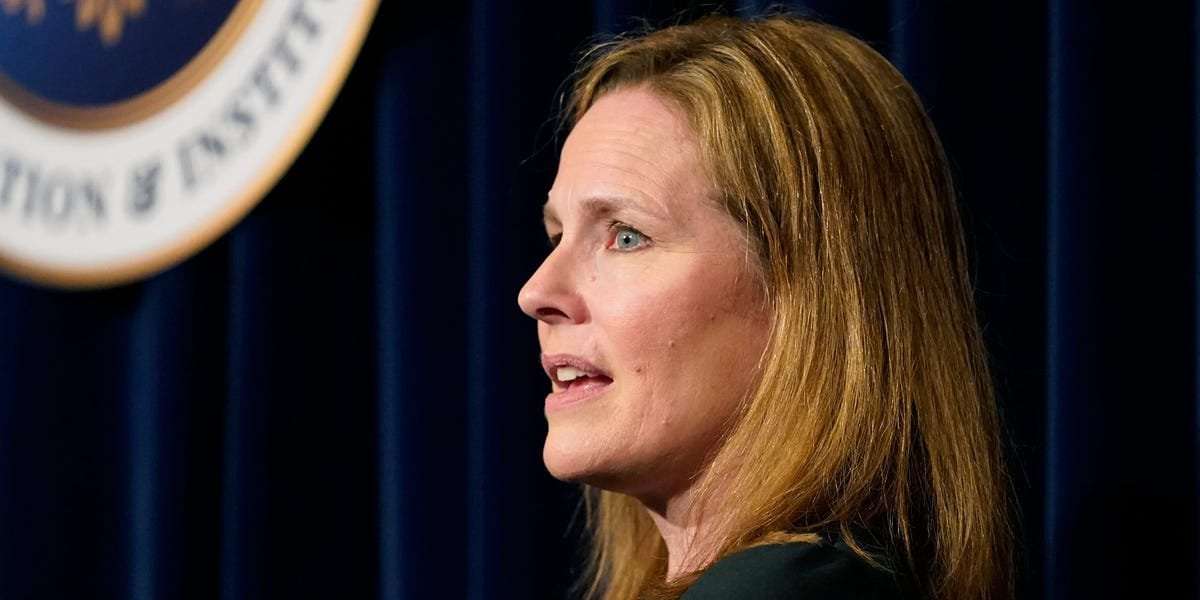Amy Coney Barrett questioned whether a group of GOP-led states have standing to block Biden's student-debt relief.
The court's three liberal justices also focused on standing during Tuesday's oral arguments.
The states said the relief would harm Missouri-based student-loan company, MOHELA.
Top editors give you the stories you want — delivered right to your inbox each weekday. Loading Something is loading. Thanks for signing up! Access your favorite topics in a personalized feed while you're on the go. download the app Email address By clicking ‘Sign up’, you agree to receive marketing emails from Insider as well as other partner offers and accept our Terms of Service and Privacy Policy
Justice Amy Coney Barrett, a conservative, questioned whether a group of Republican-led states can legally challenge President Joe Biden's student-loan forgiveness, similar to points raised by the Supreme Court's three liberals on Tuesday.
The nation's highest court heard oral arguments in two high-profile challenges to Biden's plan that would cancel up to $20,000 in student debt for federal borrowers. The first case heard on Tuesday involved six states, which argued that the debt relief would hurt their states' tax revenues, along with the revenue of Missouri-based student-loan company, MOHELA.
The Biden administration claims that the six states – Arkansas, South Carolina, Iowa, Kansas, Nebraska, and Missouri – lack standing, or the power to block Biden's relief by showing they suffered an injury from it. MOHELA previously denied having any involvement in the case, and the Biden administration argued in a court brief that the company can sue and be sued on its own, and the states do not have the standing to declare harms to MOHELA as harms to themselves.
Barrett scrutinized the relationship between Missouri and MOHELA, repeatedly questioning whether the states could sue the Biden administration over the debt relief.
"It would be hard to see how a win for the state would benefit MOHELA, or a win for MOHELA would benefit the state, if the assets are completely separate – you don't get any money out of it," Barrett told Nebraska Solicitor General James Campbell, who's representing the states.
"If the state wanted money from MOHELA right now," Barrett added, "Does the state have the authority to do that?"
Campbell defended that Missouri has an "ultimate interest in the property of MOHELA" and the state legislature could take action to request money. Yet Barrett continued to question the states' position, saying "all of this would be a lot easier" had MOHELA filed a lawsuit against the Biden administration.
"Do you want to address why MOHELA's not here?" Barrett asked Campbell.
Campbell then claimed that "the state has the authority to speak for" MOHELA, but Barrett again pushed back.
"Why didn't the state just make MOHELA come then?" she said. "If MOHELA is an arm of the state, why didn't you just strong arm MOHELA and say, 'You've gotta pursue this suit'?"
"That's a question of state politics, but we believe as a matter of law that the state has the authority to assert its interests," Campbell said.
While a majority of the court's conservatives largely focused on whether Biden exceeded his legal authority by enacting the debt relief, Barrett mostly turned her attention to the issue of standing, which the court's three liberals, Sonia Sotomayor, Elena Kagan, and Ketanji Brown Jackson, likewise scrutinized.
"If MOHELA is being injured as a result of the plan, or at least if that's the allegation, MOHELA has the ability to defend itself and its interests, correct?" Jackson asked US Solicitor General Elizabeth Prelogar, who argued on behalf of the Biden administration.
Jackson also raised concerns about the consequences of the Supreme Court potentially expanding the principles of standing by weighing in on the legality of Biden's plan.
"I feel like we really do have to be concerned about jumping into the political fray unless we are prompted to do so by a lawsuit that is brought by someone who has an actual interest," Jackson said. "So this is why I'm sort of pressing really hard on the standing point."
MOHELA's mention in the case has fallen under scrutiny. David Nahmias, a staff attorney with the UC Berkeley Center, previously told Insider that "on one hand, when the state created MOHELA over 40 years ago, it made clear that MOHELA is separate."
"But now with this lawsuit, Missouri is trying to argue that the state will lose income by virtue of the fact that student debt cancellation possibly could cause MOHELA to lose some loan servicing revenue that possibly could be passed along to the state of Missouri," Nahmias said.
Josh Blackman, a South Texas College of Law professor, previously told Insider that the standing question is "the biggest hurdle" for the states because Biden's plan isn't "hurting people" but "helping them."
Lower courts have temporarily blocked Biden's plan from taking effect. The Supreme Court is expected to hand down its decision by June.

Forward-Emu5504 on February 28th, 2023 at 20:13 UTC »
She's been pretty much against student loan companies and other cases trying to overturn Biden's program before this one.
hifumiyo1 on February 28th, 2023 at 19:56 UTC »
Throwing it out based on standing is the only way this will work out.
wannabebrilen on February 28th, 2023 at 19:47 UTC »
I actually found that the judges all together were skeptical about whether any of the parties had standing, once Biden's lawyer explained her arguments.
I feel positive after this. Kavanaugh wanted to know why the other side didn't just take the language as it was.